《荒野的呼唤》主题分析 毕业论文
荒野的呼唤梗概作文六年级600字
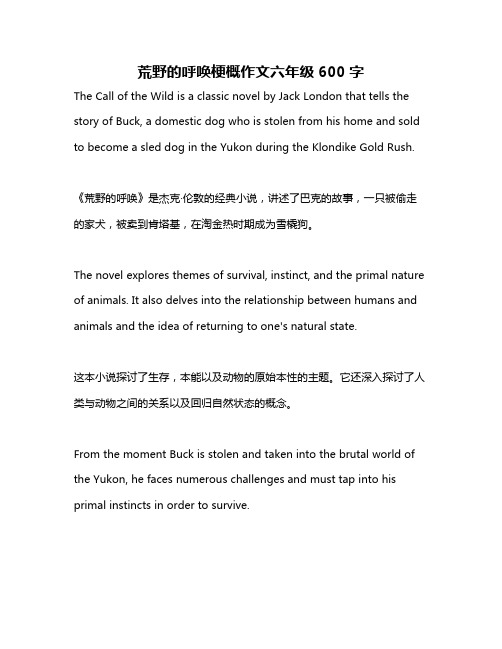
荒野的呼唤梗概作文六年级600字The Call of the Wild is a classic novel by Jack London that tells the story of Buck, a domestic dog who is stolen from his home and sold to become a sled dog in the Yukon during the Klondike Gold Rush.《荒野的呼唤》是杰克·伦敦的经典小说,讲述了巴克的故事,一只被偷走的家犬,被卖到肯塔基,在淘金热时期成为雪橇狗。
The novel explores themes of survival, instinct, and the primal nature of animals. It also delves into the relationship between humans and animals and the idea of returning to one's natural state.这本小说探讨了生存,本能以及动物的原始本性的主题。
它还深入探讨了人类与动物之间的关系以及回归自然状态的概念。
From the moment Buck is stolen and taken into the brutal world of the Yukon, he faces numerous challenges and must tap into his primal instincts in order to survive.从巴克被偷走并被带入肯塔基严酷的世界开始,他面临着很多挑战,必须发挥他的本能才能生存下去。
The novel vividly depicts the harsh and unforgiving environment of the Yukon, and the struggle for survival that both humans and animals face in such conditions.这本小说生动地描绘了肯塔基的严酷无情的环境,以及在这种条件下人类和动物面临的生存挣扎。
杰克伦敦《荒野的呼唤》多重主题解读

杰克·伦敦《荒野的呼唤》多重主题解读摘要:《荒野的呼唤》是美国近代作家杰克·伦敦重要的小说著作之一。
在小说中,杰克·伦敦通过一条狗的视角来写人类社会,从而不断地反映出人与自然的关系,并对人与自然的关系今后应该何去何从进行了深刻的思考。
除此之外,达尔文“物竞天择,适者生存”的思想也是贯彻在这本书中,通过巴克的奋斗反映了“弱肉强食”的社会。
杰克·伦敦正如同现实中的巴克,不断地为了生存而努力着,并且在最后针对生命的意义究竟是什么而陷入了深深的思考。
基于此,具体探讨杰克·伦敦《荒野的呼唤》多重性主题以及对现代社会的启示意义。
关键词:人与自然;弱肉强食;生存;生命真谛《荒野的呼唤》又翻译为《野性的呼唤》,是杰克·伦敦在1903年发表的一篇小说。
该小说以动物的视角来讲述了一条狗从一个文明社会回到野蛮社会的故事。
该小说与莫言的《生死疲劳》有异曲同工之妙,都是通过动物视角来反映人类生活的变迁,从而得以更深刻地反映人类社会的种种现象。
但杰克·伦敦《荒野的呼唤》的主人公巴克不仅仅只是在单纯地讲述这条狗经历的社会,相反,这部小说的主题内涵丰富多彩,下面就来具体看看杰克·伦敦《荒野的呼唤》涉及的多重主题及对我们现代社会的启示意义。
一、人与自然的和谐相处毫无疑问,杰克·伦敦《荒野的呼唤》是涉及到“人与自然”这一主题的,这篇小说讲述了在主人公巴克从一个生活舒适的南方被拐卖到寒冷和充满挑战的北方,周围都是最原始的荒野的情况下,其不断地接受生活带来的种种磨砺与挑战的故事。
作者的写作手法非常高明,拥有史诗般的壮阔,通过巴克在“陷入”自然之中的种种遭遇来类比人与自然的关系。
杰克·伦敦《荒野的呼唤》是他在1903年的作品,正值19世纪末20世纪初,当时美国接收到从欧洲传来的工业革命的星火,资本主义经济正在得到迅猛的发展。
在工业革命浪潮的冲击下,人民不断地去掠夺自然之中的原料,来加工成工业品或者半工业品,然后再把已经被污染了的水源和废气排回到自然之中,人们在对自然进行疯狂的掠夺,从而也催生了冒险主义,人们对金钱财富的欲望达到了无比贪婪的程度,也不再会顾忌什么生态环境之类的,所有人唯一的想法就是要去进行财富积累,从而引发了之后一系列的“淘金热”[1]。
荒野的呼唤作文梗概500字
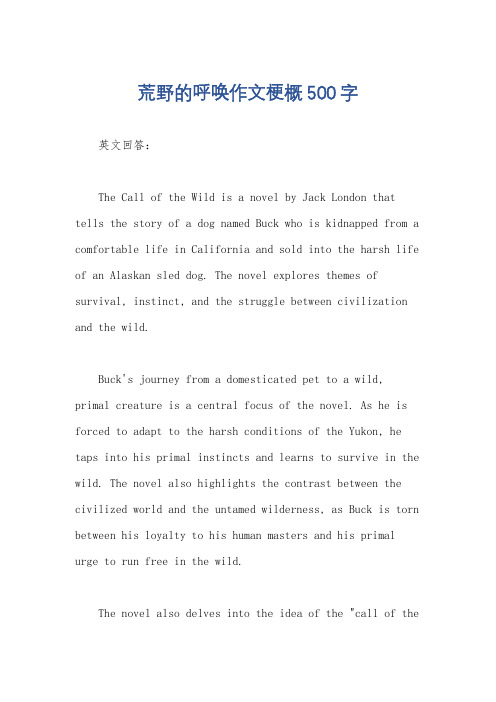
荒野的呼唤作文梗概500字英文回答:The Call of the Wild is a novel by Jack London that tells the story of a dog named Buck who is kidnapped from a comfortable life in California and sold into the harsh life of an Alaskan sled dog. The novel explores themes of survival, instinct, and the struggle between civilization and the wild.Buck's journey from a domesticated pet to a wild, primal creature is a central focus of the novel. As he is forced to adapt to the harsh conditions of the Yukon, he taps into his primal instincts and learns to survive in the wild. The novel also highlights the contrast between the civilized world and the untamed wilderness, as Buck is torn between his loyalty to his human masters and his primal urge to run free in the wild.The novel also delves into the idea of the "call of thewild," which represents the instinctual pull of the wilderness on Buck and the other dogs. This call represents the primal, untamed nature that lies within all living creatures, and Buck's journey is a reflection of this internal struggle between civilization and the wild.Overall, The Call of the Wild is a powerful and evocative exploration of the primal instincts that lie within all living creatures, and the eternal struggle between civilization and the untamed wilderness.中文回答:《荒野的呼唤》是杰克·伦敦的一部小说,讲述了一只名叫巴克的狗被绑架离开了加利福尼亚舒适的生活,被卖到了阿拉斯加的雪橇狗的艰苦生活中。
从《荒野的呼唤》探析杰克·伦敦的生态主题
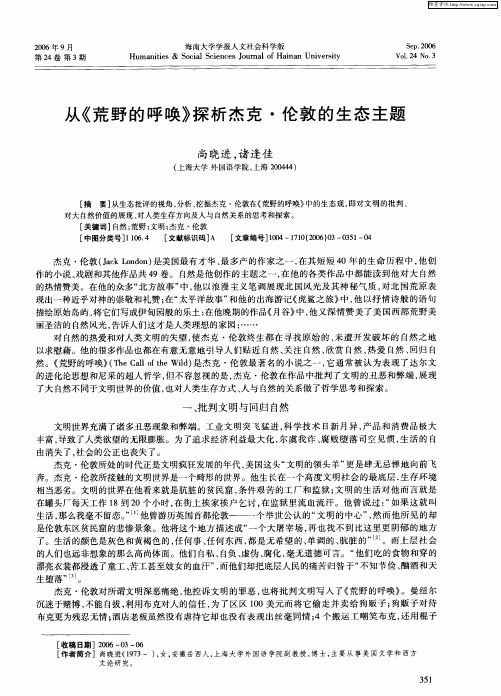
、
批判 文明与 回归 自然
文 明世 界 充满 了诸 多丑 恶 现象 和弊 端 。工 业文 明 突 飞猛 进 , 学 技 术 日新 月 异 , 品 和 消 费 品极 大 科 产 丰富 , 导致 了人 类欲 望 的无 限膨 胀 。为 了追 求 经 济利 益 最 大 化 , 虞 我诈 、 败 堕 落 司空 见 惯 , 活 的 自 尔 腐 生
生 堕落 ” 。 杰克 ・ 敦对 所 谓文 明深 恶痛 绝 , 控 诉 文 明 的罪 恶 , 将 批 判 文 明写 入 了《 野 的 呼唤 》 伦 他 也 荒 。曼 纽 尔
沉迷于赌博 , 不能 自 , 拔 利用布克对人的信任 , 了区区 10美元而将它偷 走并卖给狗贩子 ; 为 0 狗贩子对待 布克更 为残 忍无情 ; 店 老板 虽然 没有 虐待 它却 也 没 有 表现 出丝 毫 同情 ; 搬运 工 嘲 笑 布克 , 用棍 子 酒 4个 还
第2 4卷 第 3期
从《 荒野 的呼唤》 探析杰克 ・ 伦敦 的生态主题
尚晓进 , 诸逢 佳
( 上海大学 外国语学 院, 上海 2 04 044)
[ 摘
要] 从生态批评 的视角 , 、 分析 挖掘杰 克 ・ 伦敦在《 荒野 的呼 唤》 中的生态 观 , 即对文 明的批判 、
对大 自然价值 的展 现 、 对人类生存方 向及人 与 自然关 系的思考和探索 。
丽 圣洁 的 自然风 光 , 诉 人们 这才 是人 类理 想 的家 园 . …・ 告 . .
对自 然的热爱和对人类文 明的失望 , 使杰克 ・ 伦敦终生都在寻找原始的 、 未遭开发破坏 的 自然之地 以求慰藉。他的很多作品也都在有意无意地 引导人们贴近 自然 、 关注 自然 、 赏 自然 、 欣 热爱 自然 、 回归 自 然 。《 荒野 的 呼唤》 T eC lo eWi ) 杰 克 ・ 敦 最 著 名 的小 说 之 一 , 通 常 被 认 为 表 现 了 达 尔文 ( h a fh l 是 l t d 伦 它 的进化论思想和尼采 的超人哲学 , 但不容忽视 的是 , 杰克 ・ 伦敦在作品中批判 了文 明的丑恶和弊端 , 展现 了大 自 然不 同于文明世界的价值 , 也对人类生存方式 、 人与 自然的关系做了哲学思考和探索。
荒野的呼唤读后感
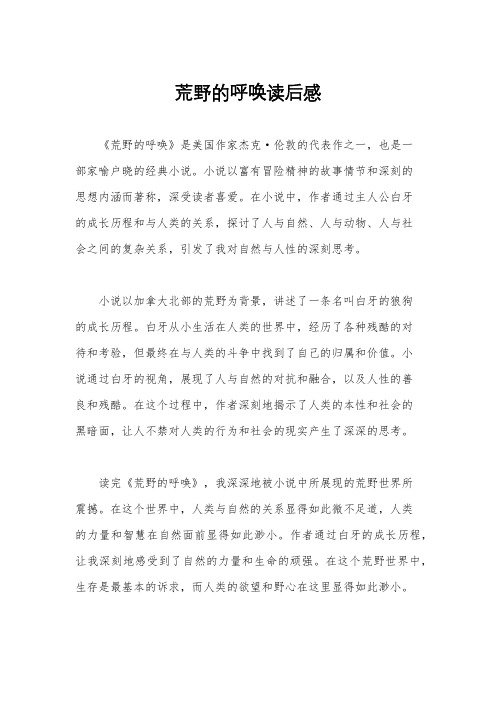
荒野的呼唤读后感《荒野的呼唤》是美国作家杰克·伦敦的代表作之一,也是一部家喻户晓的经典小说。
小说以富有冒险精神的故事情节和深刻的思想内涵而著称,深受读者喜爱。
在小说中,作者通过主人公白牙的成长历程和与人类的关系,探讨了人与自然、人与动物、人与社会之间的复杂关系,引发了我对自然与人性的深刻思考。
小说以加拿大北部的荒野为背景,讲述了一条名叫白牙的狼狗的成长历程。
白牙从小生活在人类的世界中,经历了各种残酷的对待和考验,但最终在与人类的斗争中找到了自己的归属和价值。
小说通过白牙的视角,展现了人与自然的对抗和融合,以及人性的善良和残酷。
在这个过程中,作者深刻地揭示了人类的本性和社会的黑暗面,让人不禁对人类的行为和社会的现实产生了深深的思考。
读完《荒野的呼唤》,我深深地被小说中所展现的荒野世界所震撼。
在这个世界中,人类与自然的关系显得如此微不足道,人类的力量和智慧在自然面前显得如此渺小。
作者通过白牙的成长历程,让我深刻地感受到了自然的力量和生命的顽强。
在这个荒野世界中,生存是最基本的诉求,而人类的欲望和野心在这里显得如此渺小。
另外,小说中对人与动物的关系也给我留下了深刻的印象。
在这个世界中,动物与人类之间的关系是如此微妙而又复杂。
白牙作为一只狼狗,与人类之间的关系充满了矛盾和冲突,但最终他找到了自己的归属和价值。
这让我深刻地思考了人类与动物之间的关系,以及人类对待动物的态度和行为。
在现实生活中,我们常常看到人类对待动物的残酷和不公,而小说中的情节让我深刻地反思了人类与动物之间的关系,以及人类的善良和残酷。
最后,小说中对人性的揭示也给我留下了深刻的印象。
在这个荒野世界中,人性的善良和残酷得到了充分的展现。
作者通过白牙的成长历程,深刻地揭示了人性的复杂和多面性。
在这个世界中,人类的欲望和野心往往会让人们失去理智和良知,而在与自然的斗争中,人性的善良和顽强也得到了充分的展现。
这让我深刻地思考了人类的本性和社会的现实,对人类的行为和社会的现实产生了深深的思考。
荒野的呼唤主要内容

荒野的呼唤主要内容荒野的呼唤。
荒野,是大自然的原始面孔,是未经开发的原始土地,是远离城市喧嚣的宁静之地。
荒野的呼唤,是对人类内心深处的一种召唤,是对自然的向往和渴望。
在这片荒野中,我们可以找到内心的宁静,感受大自然的力量,领悟生命的意义。
荒野的呼唤,首先是对自然的向往和渴望。
在城市中,我们常常被高楼大厦和车水马龙所包围,忙碌的生活让我们忽略了大自然的美好。
而荒野,却是大自然的原始面孔,没有人工的痕迹,没有城市的喧嚣,只有青山绿水和蓝天白云。
在这里,我们可以远离城市的喧嚣,感受大自然的宁静和美丽,找回内心深处的平静和宁静。
其次,荒野的呼唤也是对自身内心的一种召唤。
在这片荒野中,我们可以找到内心的宁静,感受大自然的力量,领悟生命的意义。
在这里,我们可以远离社会的压力和烦扰,放下内心的纷扰和焦虑,静心感受大自然的鬼斧神工,领悟生命的真谛。
在这片荒野中,我们可以与自然融为一体,感受大自然的力量,找到内心的平静和宁静。
最后,荒野的呼唤也是对生命的一种感悟和领悟。
在这片荒野中,我们可以感受到大自然的力量和生命的意义,领悟生命的真谛。
在这里,我们可以看到大自然的鬼斧神工,感受生命的顽强和奇迹。
在这片荒野中,我们可以看到大自然的生机勃勃,感受生命的无穷魅力,领悟生命的意义和价值。
荒野的呼唤,是对自然的向往和渴望,是对自身内心的一种召唤,也是对生命的一种感悟和领悟。
在这片荒野中,我们可以找到内心的宁静,感受大自然的力量,领悟生命的意义。
让我们远离城市的喧嚣,走进荒野的怀抱,感受大自然的美丽和奇妙,找到内心的平静和宁静,领悟生命的真谛。
让我们跟随荒野的呼唤,感受大自然的力量,领悟生命的意义,找到内心的宁静和平静。
愿我们都能听到荒野的呼唤,感受大自然的美丽和奇妙,领悟生命的真谛,找到内心的平静和宁静。
回归荒野重返自然——《荒野的呼唤》的生态批评解读
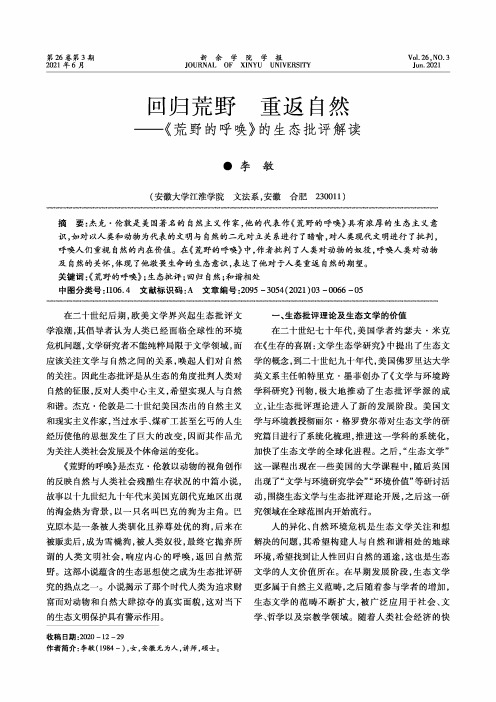
第3期
李 敏:回归荒野 重返自然——《荒野的呼唤》的生态批评解读
69
的成长故事,描写了它从对人类文明社会残酷的不 适应到适应,最后到反抗和回归荒野,而小说中的人 物角色仅仅是狗不断成长的催化剂。这种与一般小 说甚至是现实世界完全颠倒的生态系统次序,表明 了作者对人类中心主义的批判,具有浓厚的生态批 评意味。在小说的世界构架中,人类依然处于中心 统治地位,不断征服自然,但巴克最终完成了对人类 的复仇,回归了荒野,这是对人类在生态链中地位的 挑战,使之从原本的统治主体变为被推翻的对象,人 类所构建的人类中心主义世界被颠覆。最后巴克回 归荒野,反映的是人类面对的生态危机。作者呼吁 人们摒弃人类中心主义,与自然形成和谐共处的 关系。
2024年《荒野的呼唤》读后感
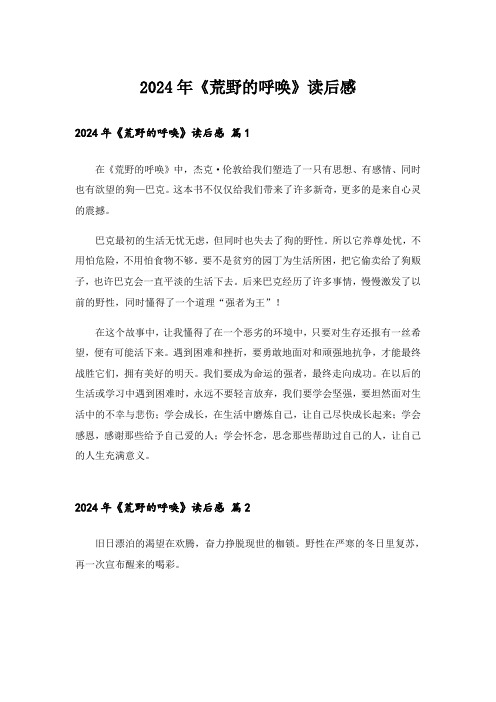
2024年《荒野的呼唤》读后感2024年《荒野的呼唤》读后感篇1在《荒野的呼唤》中,杰克·伦敦给我们塑造了一只有思想、有感情、同时也有欲望的狗—巴克。
这本书不仅仅给我们带来了许多新奇,更多的是来自心灵的震撼。
巴克最初的生活无忧无虑,但同时也失去了狗的野性。
所以它养尊处忧,不用怕危险,不用怕食物不够。
要不是贫穷的园丁为生活所困,把它偷卖给了狗贩子,也许巴克会一直平淡的生活下去。
后来巴克经历了许多事情,慢慢激发了以前的野性,同时懂得了一个道理“强者为王”!在这个故事中,让我懂得了在一个恶劣的环境中,只要对生存还报有一丝希望,便有可能活下来。
遇到困难和挫折,要勇敢地面对和顽强地抗争,才能最终战胜它们,拥有美好的明天。
我们要成为命运的强者,最终走向成功。
在以后的生活或学习中遇到困难时,永远不要轻言放弃,我们要学会坚强,要坦然面对生活中的不幸与悲伤;学会成长,在生活中磨炼自己,让自己尽快成长起来;学会感恩,感谢那些给予自己爱的人;学会怀念,思念那些帮助过自己的人,让自己的人生充满意义。
2024年《荒野的呼唤》读后感篇2旧日漂泊的渴望在欢腾,奋力挣脱现世的枷锁。
野性在严寒的冬日里复苏,再一次宣布醒来的喝彩。
这首诗是杰克·伦敦的闻名小说《荒野的呼喊》中作者心里的呼喊,这呼喊也深深地震撼着我的心。
我怀着敬仰的心境读了这书,便立即被主人公“巴克”那种一定要做日子中的主宰者,做日子的强者的精力所感动。
巴克是一条狗,本书讲述了由于淘金热潮的鼓起,巴克被人从南方主人家偷走,并且还卖到北极,成为了一条拉雪橇的苦役犬。
从此,巴克便进入了以强凌弱的世界。
面临恶劣的环境,巴克的野性开始渐渐复苏。
面临翻山越岭中,巴克在奄奄一息时,一个叫桑顿的人救了巴克。
桑顿被害今后,巴克被荒野呼喊,回归了狼群,成为了狼群里的领头。
巴克在面临困难前斗争,选择成为日子中的强者,这一点也就表明了,“只要斗争就能成功。
”巴克告诉咱们一个道理,日子中要做强者,强者才干自己主宰自己的生命,而弱者只能被欺凌,最终沦为悲剧。
浅析《荒野的呼唤》中的象征意义

文学评论·外国文学浅析《荒野的呼唤》中的象征意义张妮 南通大学外国语学院摘 要:文学作品中各种手法的运用,能够使文学作品本身活灵活现,更好地展现和诠释深层次内涵和意义,可以将作家的思想、意图通过作品的形式形象地传达给读者。
美国文学作品《荒野的呼唤》就是象征手法最形象的体现。
作者通过对象征手法的运用将自己的思想内涵表达得淋漓尽致。
本文将对美国文学作品《荒野的呼唤》中的象征意义进行探讨。
关键词:《荒野的呼唤》;象征;解读作者简介:张妮(1983.10-),女,汉族,江苏南通市人,南通大学外国语学院硕士研究生在读,南通师范高等专科学校专任教师,研究方向:英美文学。
[中图分类号]:I106 [文献标识码]:A[文章编号]:1002-2139(2017)-15-130-01提及美国文学作品的标识性作品,往往就会想到《荒野的呼唤》。
这本描述狗的经典小说,是由美国作家杰克·伦敦编著的。
它主要以动物——具备坚强野性的狗为主要元素进行独特叙事,其中通过感人的故事情节、象征手法的巧妙应用、形象的表达方式等,向读者展示了一条狗为了生存而进行了各种斗争,最终回归自然回归本真的故事。
小说中象征手法的恰当运用赋予了该文学作品深邃的思想内涵。
一、《荒野的呼唤》基本情节概述《荒野的呼唤》是美国最著名的小说家之一杰克·伦敦的作品。
小说的故事意味深长、发人省醒。
它既是一门描述动物的小说,以狗为主线进行讲述狗与自然的斗争和生存,巴克,本来生活在具备优越条件的南方,在被拐卖到了北方之后,在恶劣艰险的环境下通过不断训练自己、与自然、竞争对手展开斗争等,最后激发了力量和潜能,成为了融入狼群的一员;也是一本探险性小说,从深层意义上对美国社会当时淘金者的生活状态和斗争方式进行了形象表达。
还有的人说这也是一本寓言故事,通过狗的故事描述展示了人类中人性的东西:既有斗争也有团结,有感恩也有背叛,有懦弱也有坚强;有考验也有力量。
论《荒野的呼唤》中的自然主义体现
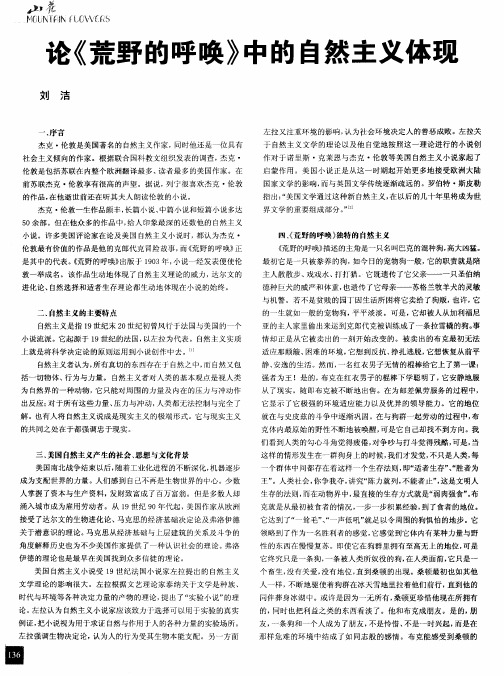
于 自然 主 义 文 学 的 理 论 以及 他 自觉 地 按 照 这 一 理论 进 行 的小 说创 作 对 于 诺 里 斯 ・ 莱 思与 杰 克 ・ 敦 等 美 国 自然主 义 小 说 家起 了 克 伦 启 蒙 作 用 。 美 国 小说 正是 从 这 一 时 期 起 开 始 更 多地 接 受 欧 洲 大 陆 国 家文 学 的 影 响 , 与 英 国文 学 传 统逐 渐 疏远 的 。罗 伯特 ・ 皮勒 而 斯
敦 一举 成 名 。 该作 品生 动地 体 现 了 自然 主 义 理 论 的威 力 , 尔 文 的 达 进 化论 、 自然 选 择和 适 者 生 存理 论 都 生动 地 体 现 在 小说 的始 终 。
四 、荒野的呼唤》 《 独特的 自然主义
《 荒野 的呼 唤》 述 的主 角 是一 只名 叫 巴克 的混 种狗 , 大凶猛 。 描 高
荐
N L 一l } , OJ 0 Nt i
论《 荒野 的呼唤》 中的 自然主义体现
刘 影 响 , 为社 会 环 境 决定 人 的 善恶 成 败 。左 拉 关 认
杰克 ・ 伦敦 是 美 国 著名 的 自然 主义 作 家 ,同时他 还 是 一 位 具有 社 会主 义 倾 向的作 家 。根 据 联 合 国科 教 文 组织 发 表 的 调 查 , 克 ・ 杰 伦 敦是 包 括 苏联 在 内整个 欧 洲 翻译 最 多 、 者 最 多 的美 国 作 家 。在 读 前 苏联 杰 克 ・ 敦 享有 很 高 的 声 望 。据 说 , 宁很 喜 欢 杰 克 ・ 敦 伦 列 伦
小说 流 派 。它 起源 于 1 纪 的法 国 , 9世 以左 拉 为代 表 。自然主 义 实 质
《荒野的呼唤》读后感500字作文
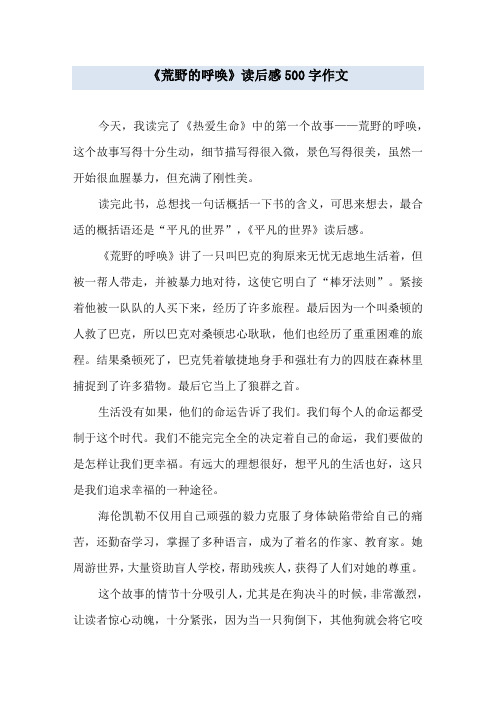
《荒野的呼唤》读后感500字作文今天,我读完了《热爱生命》中的第一个故事——荒野的呼唤,这个故事写得十分生动,细节描写得很入微,景色写得很美,虽然一开始很血腥暴力,但充满了刚性美。
读完此书,总想找一句话概括一下书的含义,可思来想去,最合适的概括语还是“平凡的世界”,《平凡的世界》读后感。
《荒野的呼唤》讲了一只叫巴克的狗原来无忧无虑地生活着,但被一帮人带走,并被暴力地对待,这使它明白了“棒牙法则”。
紧接着他被一队队的人买下来,经历了许多旅程。
最后因为一个叫桑顿的人救了巴克,所以巴克对桑顿忠心耿耿,他们也经历了重重困难的旅程。
结果桑顿死了,巴克凭着敏捷地身手和强壮有力的四肢在森林里捕捉到了许多猎物。
最后它当上了狼群之首。
生活没有如果,他们的命运告诉了我们。
我们每个人的命运都受制于这个时代。
我们不能完完全全的决定着自己的命运,我们要做的是怎样让我们更幸福。
有远大的理想很好,想平凡的生活也好,这只是我们追求幸福的一种途径。
海伦凯勒不仅用自己顽强的毅力克服了身体缺陷带给自己的痛苦,还勤奋学习,掌握了多种语言,成为了着名的作家、教育家。
她周游世界,大量资助盲人学校,帮助残疾人,获得了人们对她的尊重。
这个故事的情节十分吸引人,尤其是在狗决斗的时候,非常激烈,让读者惊心动魄,十分紧张,因为当一只狗倒下,其他狗就会将它咬死。
孙少平是我最喜欢的人物,他在学校中不仅学习成绩好,运动也很好。
看到他每天在学校角落里偷偷吃干硬的窝头,为了节省钱,从来不去食堂买菜吃时,感到很凄凉。
虽然经过了许多努力仍然没有考上大学,但是少安并没有放弃自己。
在帮助哥哥把窑厂搞起来之后,就外出寻找工作,做了工地上的工人,很巧的是他遇到了自己的同学田晓霞。
田晓霞是县委副主任的女儿,现在时一名记者。
在小霞的帮助下,孙少平阅读了大量的名著,继续坚持着自己的梦想,即使是一名微不足道的煤矿工人,也从来没有怨恨过。
经过长时间的相处,少平与小霞成为了一对男女朋友,但是好景不长,小霞在一次洪水采访时,不幸遇难死了,少平很痛苦,再一次煤矿事故中受了重伤。
《荒野的呼唤》的象征主义解读

摘要:《荒野的呼唤》成功的原因之一就在于书中象征手法的运用赋予了作品深邃的思想内涵。
小说中巴克、史匹兹、棍棒、红色和白色五种意象分别具有不同的象征意义。
巴克象征适者生存的强者、受压迫者和反抗者;史匹兹象征独裁者;棍棒象征权力、不平等和冷酷;红色象征野蛮、凶残;白色象征恐怖、死亡和将冰原拟物化的白色野兽。
关键词:荒野的呼唤;象征主义;巴克;史匹兹《荒野的呼唤》是美国著名小说家杰克·伦敦于1903年创作的一本动物小说。
这部作品不仅故事引人人胜,而且具有深邃的思想和高超的艺术,被视为作家最大的文学成就,美国文学的经典,先后被译成9O多种语言,有“伟大的世界小说”之称。
该书象征手法的运用尤为成功,小说里的主要人物巴克和史匹兹,以及棍棒、红色和白色意象的反复出现,赋予了作品独特而深远的象征意义。
正如评论家范怀克·布鲁克斯(Van WyckBrooks)所说:“在某种意义上,杰克·伦敦的故事被象征地讲述——是用以解释为什么《荒野的呼唤》也许是他最好的书的原因”u 。
象征历来是文学写作中的一种重要的表现手法。
美国评论家亚瑟·西蒙斯说,象征是“形式对思想,有形对无形的一切约定俗成的表现”· 。
T.S.艾略特则推崇“好的诗歌使感情客观化,通过对事物的描写——通过…客观对应物‟间接地表达感情” ,也就是说,象征是通过客观世界中的具体事物或形象来间接表达诗人或作家的思想与情感。
同时,象征与意象、隐喻极易混淆,关于三者之间的区别,韦勒克·沃伦在《意象,隐喻,象征,神话》一文中曾明确指出,“意象或隐喻反复并持续出现,就成为象征,继而成为整部作品象征体系的一部分” 。
那么象征意义是如何产生的呢?根据象征的不同来源,一般分为公用性象征和私人性象征。
前者往往是社会上约定俗成的,它植根于深厚的文化传统、文学典故,或来自常识性的联想,或远古的图腾崇拜,或宗教仪式,或神话故事,经过漫长的积淀和强化,在文学周围形成一种固定的文化背景。
论文:野性的呼唤
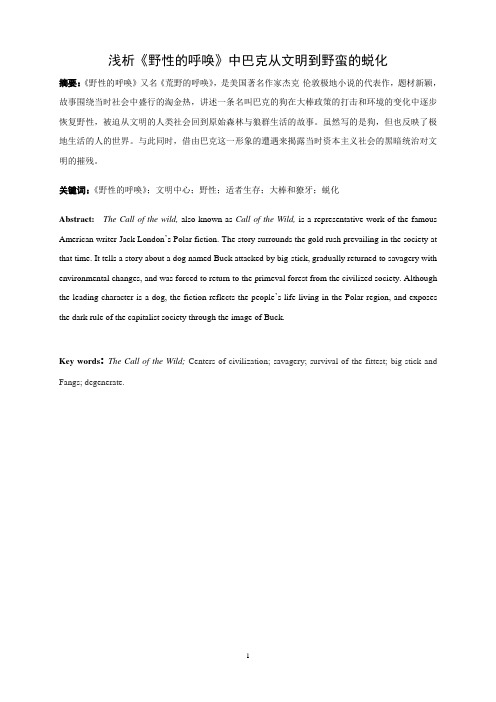
浅析《野性的呼唤》中巴克从文明到野蛮的蜕化摘要:《野性的呼唤》又名《荒野的呼唤》,是美国著名作家杰克·伦敦极地小说的代表作,题材新颖,故事围绕当时社会中盛行的淘金热,讲述一条名叫巴克的狗在大棒政策的打击和环境的变化中逐步恢复野性,被迫从文明的人类社会回到原始森林与狼群生活的故事。
虽然写的是狗,但也反映了极地生活的人的世界。
与此同时,借由巴克这一形象的遭遇来揭露当时资本主义社会的黑暗统治对文明的摧残。
关键词:《野性的呼唤》;文明中心;野性;适者生存;大棒和獠牙;蜕化Abstract:The Call of the wild, also known as Call of the Wild, is a representative work of the famous American writer Jack London’s Polar fiction. The story surrounds the gold rush prevailing in the society at that time. It tells a story about a dog named Buck attacked by big-stick, gradually returned to savagery with environmental changes, and was forced to return to the primeval forest from the civilized society. Although the leading character is a dog, the fiction reflects the people’s life living in the Polar region, and exposes the dark rule of the capitalist society through the image of Buck.Key words:The Call of the Wild; Centers of civilization; savagery; survival of the fittest; big-stick and Fangs; degenerate.杰克·伦敦是20世纪初美国著名现实主义作家。
大学本科毕业设计论文—《荒野的呼唤》中巴克的多重性格分析

学科分类号湖南涉外经济学院本科学生毕业论文题目《荒野的呼唤》中巴克的多重性格分析Analysis of the Complicated Nature ofBuck in The Call of the Wild姓名学号学部外国语言文学学部专业、年级英语本科0602班指导教师年月湖南涉外经济学院本科毕业论文诚信声明本人郑重声明:所呈交的本科毕业论文,是本人在指导老师的指导下,独立进行研究工作所取得的成果,成果不存在知识产权争议,除文中已经注明引用的内容外,本论文不含任何其他个人或集体已经发表或撰写过的作品成果。
对本文的研究做出重要贡献的个人和集体均已在文中以明确方式标明。
本人完全意识到本声明的法律结果由本人承担。
本科毕业论文作者签名:二○一○年四月二十七日一、湖南涉外经济学院本科毕业论文开题报告书论文题目《荒野的呼唤》中巴克的多重性格分析作者姓名汤浩坤所属学部专业年级外国语言文学学部英语专业2006级指导教师姓名、职称马玉侠讲师预计字数6000开题日期2010.1.4选题的根据:《荒野的呼唤》是美国著名作家杰克·伦敦于1903年发表的成名作。
作者赋予了巴克与人相同的情感和品质,将其人性化了。
狗主人公巴克复杂多样的性格、艰苦卓绝的生存道路,生动真切地反映了作者所处时代的美国社会的现实,再现了美国历史上的克朗代克淘金热。
巴克的这些性格特征在很大程度上正是现实社会中人的真实写照,因此对其性格的剖析、研究具有现实意义。
外国学者对《荒野的呼唤》的研究,经历了从研究方法到研究视角的不同侧重和转变,折射出独特的文化特征。
我国对杰克·伦敦及其作品的介绍与翻译、研究工作起步于20世纪20年代,30年代达到高潮。
作为杰克·伦敦的成名作和代表作《荒野的呼唤》在以后90余年的历史中被中国学者反复地翻译和研究,可见它的重要性。
由美国麦吉尔编、王志远翻译的《世界名著鉴赏大辞典·小说卷(中)》有专篇对《荒野的呼唤》一文的鉴赏(中国书籍出版社,1993)。
《荒野的呼唤》读后感:适者生存

《荒野的呼唤》读后感:适者生存《荒野的呼唤》读后感:适者生存:《荒野的呼唤》是美国作家杰克·伦敦所创作的小说。
这部小说让我们明白了适者生存这个法则,在竞争激烈的社会中,我们只有牢记这个生存法则,让自己变得更加强大,才能获得胜利的果实。
《荒野的呼唤》是以一只叫做巴克的狗为主人公的故事,是美国作家杰克·伦敦所创作的小说。
阅读了这部小说,我的内心深受触动。
《荒野的呼唤》主要讲述了叫巴克的狗被别人偷去并拐卖到了荒野中当雪橇狗。
从此,巴克就从一个被豢养的环境中走进了一个弱肉强食的世界。
为了能够在恶劣的环境中生存,巴克慢慢地复苏了野性,并在不断地磨练中成长。
后来,巴克被一个叫做约翰·桑顿的人从残暴的哈尔手中解救了出来,所以巴克决定一辈子对约翰·桑顿忠诚。
但是,约翰·桑顿却被别人害死了。
巴克对人类最后一点眷恋也随着约翰·桑顿的遇害而消失殆尽。
最终,巴克在野性的呼唤下,走进了荒野中,回归到大自然。
在这本书中,我们可以看到一个有血有肉的丰满世界,也可以感受到在荒野生存的不易。
在恶劣的自然环境中,巴克并没有被厄运所打倒,而是坚强的活了下来。
在这个过程中,巴克也变得越来越强大,最终成为了胜利者。
巴克用自己的行动向我们展现了大自然适者生存的规则,谁更加坚强,更加强大,那么谁就能够在大自然中存活,谁就是大自然的王者。
其实,我们的现实社会也跟大自然一样,我们若想要在社会上生存,谋求更好的发展,就需要努力让自己变得更加强大,这样才能够在诸多竞争者中脱颖而出,成为最后的胜利者。
若是我们在遇到挫折的时候就退缩,就逃避,那么我们就永远都无法取得胜利的果实,迎接我们的就只有失败。
在竞争日益激烈的社会中,我们一定要像《荒野的呼唤》中的巴克一样克服困难,强大自身,牢牢记住“适者生存”这个法则,在残酷的竞争中坚持到底,取得胜利。
作者:zzz。
从电影《荒野的呼唤》看原著多种主题的艺术性
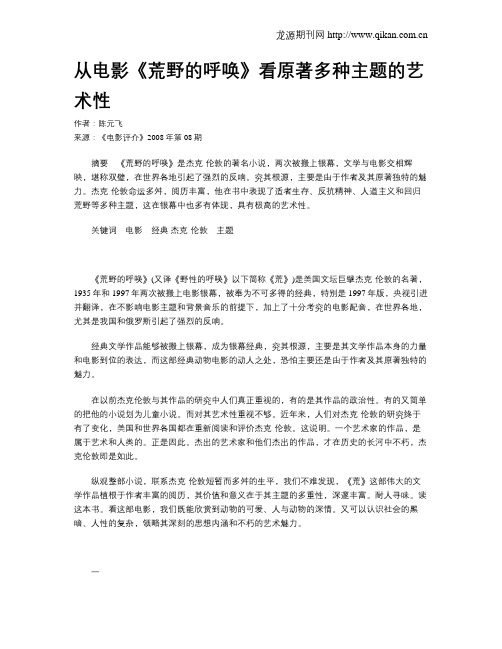
从电影《荒野的呼唤》看原著多种主题的艺术性作者:陈元飞来源:《电影评介》2008年第08期摘要《荒野的呼唤》是杰克·伦敦的著名小说,两次被搬上银幕,文学与电影交相辉映,堪称双璧,在世界各地引起了强烈的反响。
究其根源,主要是由于作者及其原著独特的魅力。
杰克·伦敦命运多舛,阅历丰富,他在书中表现了适者生存、反抗精神、人道主义和回归荒野等多种主题,这在银幕中也多有体现,具有极高的艺术性。
关键词电影经典杰克·伦敦主题《荒野的呼唤》(又译《野性的呼唤》以下简称《荒》)是美国文坛巨擘杰克·伦敦的名著,1935年和1997年两次被搬上电影银幕,被奉为不可多得的经典,特别是1997年版,央视引进并翻译,在不影响电影主题和背景音乐的前提下,加上了十分考究的电影配音,在世界各地,尤其是我国和俄罗斯引起了强烈的反响。
经典文学作品能够被搬上银幕,成为银幕经典,究其根源,主要是其文学作品本身的力量和电影到位的表达,而这部经典动物电影的动人之处,恐怕主要还是由于作者及其原著独特的魅力。
在以前杰克伦敦与其作品的研究中人们真正重视的,有的是其作品的政治性。
有的又简单的把他的小说划为儿童小说。
而对其艺术性重视不够。
近年来,人们对杰克·伦敦的研究终于有了变化,美国和世界各国都在重新阅读和评价杰克·伦敦。
这说明。
一个艺术家的作品,是属于艺术和人类的。
正是因此。
杰出的艺术家和他们杰出的作品,才在历史的长河中不朽,杰克伦敦即是如此。
纵观整部小说,联系杰克·伦敦短暂而多舛的生平,我们不难发现,《荒》这部伟大的文学作品植根于作者丰富的阅历,其价值和意义在于其主题的多重性,深邃丰富。
耐人寻味。
读这本书。
看这部电影,我们既能欣赏到动物的可爱、人与动物的深情。
又可以认识社会的黑暗、人性的复杂,领略其深刻的思想内涵和不朽的艺术魅力。
一1876年1月12日,杰克·伦敦生于旧金山。
2024年荒野的呼唤读后感参考范文

2024年荒野的呼唤读后感参考范文《荒野的呼唤》是美国作家杰克·伦敦的一部经典之作,它以对自然的热爱和对人性的思考为主题,给读者带来了深刻的触动。
在读完这本小说后,我深深地被主人公巴克的坚韧勇气和对自由的渴望所打动,并对人与自然的关系有了新的认识。
小说以狗类的视角展开,讲述了圣伯纳犬巴克的成长经历。
巴克是一个性格温顺的家养狗,但他的一切被人类的贪欲所摧毁。
在被绑架和出售为苦力的过程中,巴克失去了所有的安逸与自由,几次险于丧命,但功夫不负有心人,巴克在困境中逐渐发展出强大的求生能力。
在与人与野性动物的战斗中,他逐渐成为一只不退缩,勇往直前的野生狼犬。
小说通过对巴克的一路艰辛成长描写,引申出人与自然的关系。
伦敦的笔触娴熟地展示了大自然的神奇和强大,同时也反映出人类对自然的欺压和对动物的残忍。
通过巴克的眼睛,读者能够感受到自然界的美妙和残酷,领悟到人类对自然的破坏有多么荒谬可悲。
作者反复强调的自然界的法则和规律,让我深思人类自身的局限和虚妄。
与此同时,《荒野的呼唤》也让我对人性产生了更深的思考。
在小说中,作者成功地刻画了众多的人物形象,从北方拐子到约翰·桑顿,每一个人物都代表着不同的品性和行为准则。
其中,我对约翰·桑顿的形象最为印象深刻。
桑顿是一位无私、勇敢、坚定的人物,在与巴克的相处中展现出对自然的尊重和对动物的善待。
他的出现为巴克带来一丝温暖和希望,更重要的是,在他的引导下,巴克找回了自己真正的本性和自由。
通过对人物的塑造和情节的展开,《荒野的呼唤》揭示了人类的贪婪和自私对自然界的危害和对他人的伤害。
小说中的贪婪商人展现出人性的丑陋面,而拥有良善品质的人物则给予读者希望和勇气。
通过对这些人物的对比,读者深刻意识到人类如何应对自然以及自身的选择,对人性有了更加深入的思考。
另外,小说中的巴克自由的追求和对大自然的热爱,也让我重新认识到自由的意义。
巴克在漫长的求生之路中,经历了一次次的生与死的挣扎,却从未放弃对自由的渴望。
荒野的呼唤作文梗概500字
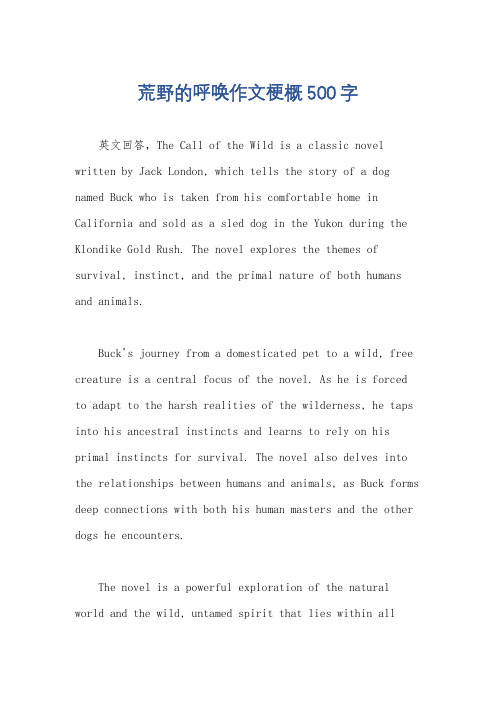
荒野的呼唤作文梗概500字英文回答,The Call of the Wild is a classic novel written by Jack London, which tells the story of a dog named Buck who is taken from his comfortable home in California and sold as a sled dog in the Yukon during the Klondike Gold Rush. The novel explores the themes of survival, instinct, and the primal nature of both humans and animals.Buck's journey from a domesticated pet to a wild, free creature is a central focus of the novel. As he is forced to adapt to the harsh realities of the wilderness, he taps into his ancestral instincts and learns to rely on his primal instincts for survival. The novel also delves into the relationships between humans and animals, as Buck forms deep connections with both his human masters and the other dogs he encounters.The novel is a powerful exploration of the natural world and the wild, untamed spirit that lies within allliving creatures. It is a gripping and emotional tale that captures the essence of the wilderness and the call that beckons all creatures to return to their primal roots.中文回答,《荒野的呼唤》是杰克·伦敦写的一部经典小说,讲述了一只名叫巴克的狗被从加利福尼亚舒适的家中带走,被卖为在克朗代克淘金热期间在育空成为雪橇犬。
荒野的呼唤800字

荒野的呼唤读后感800字:上周,我读了美国著名作家杰克.伦敦的作品《荒野的呼唤》,书里讲述的布克的故事,使我记忆深刻。
该书的主人公是一条狗,本来过着舒适的生活,因为在北极掀起的淘金热,人们需要大量的拉雪橇的狗,才被主人的园丁助手曼纽尔卖到了北国。
它一共和六个主人打交道,每一次都给了他不可磨灭的记忆。
第一个主人给了他舒适的生活;第二位的主人红衣衫(训练狗的人)教会了他一个认他铭记一生的道理一一是不可能打败一个拿着棍子的人的;他在第三任主人信差那儿,他与狗的头领史皮兹决一死战,杀死了他,并代替了他,成为了狗中的领袖;第四个主人只把它当做工具,让他们拖着沉重的货物,一口气跑了两千多里,使他们那一队狗都累得不行了;第五任主人是个蠢家伙,他用便宜的价格买下他们之后,不给他们丝毫休息的时间,还冒险在融化的冰层上奔驰,最后冰裂开了,他们和狗一起掉进河里淹死了,只有布克被约翰·宋顿给救了;这最后的主人与布克在相处中建立了深第一:布克具备坚强的生存能力。
他周围的众多伙伴,在经历了一次又一次的困难和危险后都无奈的倒下了,只有布克坚强的活了下来。
这让我联想到我们生活的社会就象一个残酷的战场,万一坚持不住倒下去,你就必须尽快的站起来,否则你将永远起不来了。
悲伤会把你彻底打垮,让你丧失斗志。
只有顽强站着的人才能生存下去。
如果我们遇到一点挫折就被打倒,那么就还不如一条狗,也更不会在将来大有作为。
站着的人应该让自己站得更高,才能不断进步,并继续寻找更高的立足点。
第二:人的贪欲十分可怕。
第五任主人被贪欲驱使穿过已经开始融化的湖面,结果没有性命,就连约翰·宋顿也是因为想要多拿一些黄金,才被土著人杀死了。
贪真是太可怕了。
《荒野的呼唤》是一本非常不错的小说,希望大家能在空闲时读一读读后感观后感听后感写作技巧什么是读/观/听后感?顾名思义,先来读,再有感受和想法。
读后感,就是在读过一篇文章或一本之后,把获得的感受、体会以及受到的教育、启迪等写下来,写成的文章就叫“后感”。
- 1、下载文档前请自行甄别文档内容的完整性,平台不提供额外的编辑、内容补充、找答案等附加服务。
- 2、"仅部分预览"的文档,不可在线预览部分如存在完整性等问题,可反馈申请退款(可完整预览的文档不适用该条件!)。
- 3、如文档侵犯您的权益,请联系客服反馈,我们会尽快为您处理(人工客服工作时间:9:00-18:30)。
【标题】《荒野的呼唤》主题分析【作者】龚琳【关键词】适者生存;人性;自然主义【指导老师】张亚军【专业】英语【正文】I. IntroductionBefore there was Hemingway, Steinbeck, Kerouac, and Mailer, there was Jack London. Perhaps no other American writer led a life as exciting as that described in his fiction. Born in San Francisco to an unwed mother from a wealthy background. Jack London grew up in the slum area of Oakland, California, a place which he later called “the cellar of society.” Born out of wedlock on January 12, 1876, he never knew his father, William Henry Chaney, who had left Jack’s mother, Flora Wellman, before Jack’s birth. On September 7, 1876, Flora Wellman married John London, from whom her son Jack took his name.By the age of fifteen, London had turned delinquent. Barely seventeen, he signed aboard the schooner Sophie Sutherland, bound for Japan and the Bering Sea. Returning from the voyage in 1894, London began to be interested in the plight of the underprivileged and working classes, so he joined a group of militant workers who were going to Washington to protest the wretched working conditions in the country, caused by the Depression of 1894. He did not reach Washington, however; he deserted this “Industrial Army” in Hannibal, Missouri, and for a time he traveled around the country as a hobo. At Niagara Falls, he was arrested for vagrancy and sentenced to the Erie County Penitentiary. He was released after thirty days, and he quickly caught the first train heading West, arriving eventually in Oakland.It was probably soon after his release from the penitentiary that London became seriously interested in politics, and as a result, he joined an Oakland branch of the Socialist Labor Party in April 1896. Then soon afterward, he enrolled as a student at the University of California at Berkeley, where he attempted to further his studies in the most influential scientific and philosophic theories of the late nineteenth century—Darwinism, Social Darwinism, Nietzscheism, and Marxism. He soon became restless, though, and he left the university during his second semester as a student. From California, he went North, to the Klondike to search for gold, and his adventures there became the basis of many stories. In fact, two of his most famous novels, The Call of the Wild and White Fang,are set in the North, and while these two novels are perhaps his most famous in the United States, London is equally well known in places outside of the United States as the author of a number of socialistic works: The Iron Heel (1908), The War of the Classes (1905), Revolution and Other Essays (1910), and The People of the Abyss (1903). London has said that The People of the Abyss was his favorite book; it is a sociological study about the worst areas of poverty in London, England’s East End and is based on London’s first-hand experiences while he lived there.Early in 1900, London married Bessie Maddern and began his career as a serious writer. He soon finished his first novel, A Daughter of the Snows, which was published in 1902, and in the summer of 1903, London met Charmian Kittredge, whom he promptly fell in love with and abruptly left his wife and two daughters for.In ill health most of his life, by 1915, London was almost lame. His bowels gave him continual pain, and in order to reduce the pain, London began using opium and morphine, and it was not long before he became addicted to the drugs. As a consequence, his kidneys were also eventually wrecked by his misuse of all of the drugs, and London refused to even quit smoking, although he had cancer of the throat. By November 21,1916, London was in such poor health that he spent the entire day in bed. Then shortly before dawn the next day, he injected himself with what would prove to be an overdose of drugs. That evening, he died; he was forty years old. There is, naturally, some question as to whether his death was an intentional suicide.Jack London wrote lots of works in his whole life, one of the most popular is the Call of the Wild which was Published in 1903, and it is generally considered one of his best. Because the protagonist is a dog, it is sometimes classified as a juvenile novel, suitable for children, but it is dark in tone and contains numerous scenes of cruelty and violence.The plot concerns a previously domesticated and even somewhat pampered dog named Buck, whose primordial instincts return after a series of events finds him serving as a sled dog in the treacherous, frigid Yukon during the days of the 19th century Klondike Gold Rushes. Although the novel has long been considered a children’s book, many literary scholars have argued that the novel’s complexities warrant close analysis. Chief among the topics of interest to scholars is the novel's relationships to the philosophy of the “survival of the fittest” that was in vogue at the turn of the century.II. Survival for the FittestCharles Darwin, in The Origin of Species (1859), developed a theory that life on earth evolved through a process of natural selection. Those creatures that were strong and were able to adapt to their environment were the ones that survived. The process as seen by Darwin was ruthless and amoral; there was no beneficent God overseeing it and ensuring justice or tempering it with mercy. London appears to have had Darwin in mind when hewrote The Call of the Wild. (When London himself went to the Klondike in 1897, he took a copy of Darwin’s book with him.)A. Law of FangFrom the very beginning of this novelette, in Chapter one, as soon as Buck is ki dnapped from Judge Miller’s ranch, he learns that a new law applies to life, quite different from the “law of love and fellowship” he has known before. London calls this the “law of club and fang,” a succinct phrase that describes in a nutshell the survival of the fittest. The law of the club is that man, having access to greater force, is the master of the dogs. The stronger wins control, and the weaker must submit and serve the will of the conqueror, or be killed. In Chapter one, for example, Buck learns for the first time that there can be other relationships between man and dog than the one he has known. The man in the red sweater who clubs him into submission is his introduction to a ruthless world in which the strong rule—“law of fang,” and Buck makes his first adaptation to it. Adaptation is the key. He also adapts to the “law of fang,” which applies to the dog world. He first sees this at work when his friend Curly naively tries to make friendly advances to the other dogs. She is torn to pieces within minutes. The death of Curly shows him that just as he has learned a new relationship between man and dog, here in the north there is a new relationship between dog and dog. A dog must prevail through ferocity, strength and courage; to show weakness is to be killed. It is notable how quickly he adapts to all the challenges that face him. He has left the civilized world far behind. He is now prepared to steal food for his master, something that would not have occurred to him in his life with Judge Miller. Buck realizes, “So that was the way. No fair play. Once down, that was the end of you”. He resolves never to go down. This sets the pattern for the remainder of the novel. Buck proves himself to be the strongest, the most resourceful, and the most courageous. Since he is the fittest, he is the one who survives in the “ruthless struggle for existence”. Emphasizes the external dangers of the wild. Life within the world of gold rush towns and sled teams can be dangerous enough, as Curly’s death and Buck’s rivalr y with Spitz demonstrate. But worse threats lurk beyond the confines of camps and mail routes—wild dogs, for one thing, and madness, for another. Hunger also threatens a terrible enemy that has transformed the wild dogs into weird, skeletal, half-mad creatures. At this point, hunger is not a direct threat to Buck, since Francois and Perrault are responsible masters. But later in the novel, when Buck is in the care of less experienced humans, it rears its head again, and the image of the starving wild dogs f oreshadows Buck’s later experience with hunger.B. Change of BuckMeanwhile, the competition between Buck and Spitz, in which each strives to be “the dominant primordial beast,” builds to a climactic resolution. In the Buck-Spitz war, we see again the way that London's dogs resemblehumans: Buck’s revolt against Spitz is first of all a matter of strength versus strength, but it is also political. Buck does not merely attack Spitz head-on; instead, he slyly undercuts Spitz’s authority among the other dogs by siding with the weaker animals in disputes. Thus, he paves the way for his own leadership even before the final confrontation arrives.While Darwinism clearly influenced London’s writing, the Buck-Spitz conflict seems to be more suggestive of the ideas of Friedrich Nietzsche—a German philosopher of the late nineteenth century. Nietzsche argued that all of society was divided up into those who were naturally masters and those who were naturally slaves. Nietzsche further argued that life was a constant struggle either to rule or be ruled; the “will to power,” as he termed it, replaced a conventional system of morality or ethics. He frequently resorted to animal metaphors, referring to the conquering rulersas “birds of prey” and“blonde beasts,” and to their victimsas “sheep” and“herd animals.” In The Call of the Wild, London transposes Nietzsche's arguments about human competition to dogs in the Klondike, casting Buck as the dominant beast whose “will to power” is unmatched. His language is almost self-consciously Nietzschean: he refers to Buck as a “masterful dog,” filled with“pride” and looking forward to a “clash for leadership” because such a desire is in his“nature.” This chapter leaves civilized morality (“slave morality,” as Nietzsche called it) far behind. Earlier, the killing of Curly horrifies Buck, whose life in California has left him unprepared to live by a new and different set of moral principles. The demands of the wild, however, force him to reconsider his scruples to the extent that he not only fights and kills Spitz but also rejoices in doing so. The story does not criticize the new, savage Buck; instead, it applauds his victory, his conquest of Spitz, and his assumption of his destiny to rule the pack alone and defeat anyone who opposes him.The primitive law of the survival of the fittest also applies to the human world. Perrault and Fran?ois, Buck’s first owners, are shrewd men who have adapted to the demands of their environment. They are a match for whatever challenges they encounter. In contrast, Charles, Hal and Mercedes, who have recently arrived in the north from the more civilized south, fail to adapt to its demands, and as a result, they perish.III. Desire for humanityBy comparing Buck’s attitudes and behavior towards its maste rs with the way the masters treat Buck, and analyzing Buck’s response to John Thornton’s death, the author expresses the desire for humanity in this novel.A. The Relationship between Buck and Judge MillerIn Judge Miller’s place Buck loves its masters and is loyal to them. He plays with Judge Miller’s sons and protects the Judge’s daughters, on the other hand, the Judge and his children also love Buck so that Buck has specialposition in the family and has advantages over other dogs. He feels “he was king, king over all creeping, crawling, flying things of Judge Miller’s place, human included.” He is arrogant and trusts in men he knows. Because of this reason he is betrayed by men and sent north as sled—dog. Buck’s first step to the north is at a dog—buster’s yard. For two days’ suffering on the train, Buck has to learned a lots. When Buck gets out of the crate, he is in a fierce state and throws himself on a man with a club, but he gets a fatal beaten from the man. Buck understands that “he stood no chance against a man with a club”,“a man with a club was a law giver, a master to be obeyed.” 1 Buck never forgets this rule in his later life and this in his introduction to the reign of primitive law.B. The Relationship among Buck, Perrault and FrancoisTo his new master, Perrault and Francois, Buck develops no affection for them, but he none the less grows honestly to respect them. He obeys orders and does what he should do, as the book says: “He was too wise to rebel.”2 He knows the result if he resists the orders. He learns quickly and easily to pull the sleds, and gradually gets the masters’ trust and care. Francois and Perrault buy Buck and his mates to convey the documents and letters of the government. They treat Buck fairly and harshly because “Francoi s was stern, demanding instant obedience, and by virtue of his whip receiving instant obedience.”3 They look after Buck but not always. When Buck’s feet limps in agony, Francois brings fish to Buck, and “the dog–driver rubbed Buck’s feet for half an hou r each night after supper, and sacrificed the tops of his own moccasins to make four moccasins for Buck.”4 However, the first night for Buck to live outside in snow - night is difficult because it is bitterly cold. When Buck sees the tent glowing warmly in the mist of the white plain, he enters it just as he walks into Judge Miller’s house to get warm by lying by the side of the fireplace, but he is driven out of the tent. “Both Perrault and Francois bombarded him with curses and cooking utensils, till he recovered from his consternation and fled ignominiously into the outer cold.”5 Buck and his mates pull the heavy sleds day after day, the trail is long and dangerous. They have to worry about whether the ice might be broken, and must defend the attacks of wolves and huskies. Curly’s death exists in Buck’s mind for a long time. It teaches Buck a lesson that one must not fall down or he will be killed. Buck remembers it well so that he wins when he fights with Spitez for the leadership of the team. During the journey, they have a few time to rest, their food “the pound and a half of sun- dried salmon, which was his ration for each day”6 is not enough. For Buck“he never had enough, and suffered from perpetual hunger pangs.”7 In order to survive in the environment which “was neither peace, nor rest, nor a moment’s safety. All was confusion and action, and every moment life and limb were in peril. ”8 Buck keeps on learning and he grows and grows, he has learned to dig hole in snow for sleeping and does well. He has learned to steal foodfrom others without being seen. He does it secretly and cunningly. He does it not because he likes to do but because he is hungry. The instinct of survival makes him do like this. “In short, the things he did were done because it was easier to do them than not to do them.” 9 His development proves that he can survive in the fierce condition. The instincts long dead become alive again. The domesticated generation fell from him. From time to time, he dreams of his ancestors, and when he hears the song of the huskies, he is deeply moved. All of those mean that he is gradually breaking away from the civilized world and begins to get used to the new environment. Buck and his mates performance well, but Francois and Perrault leave them.C. The Relationship among Buck, Hal and CharlsThe new master is a Scotch half - breed man. Buck doesn’t like him, but Buck works hard. They pull the sled to convey letters for the gold—seekers. Excessive working makes Buck and his mates exhausted, but they still stick to their post, however, when they become extremely weak and have no use, they would be abandoned or killed. The trail is the same and boring. When Buck stops to have a rest, the memory of sun—kissed land becomes vague and the picture of h is ancestor frequently appears in Buck’s mind. Along the trail, the dog—drivers take good care of the dog, when the team get to the destination, the dog can’t walk any more. New dog—team will replace the original one. Buck and his mates are sold again because they are useless and “the worthless ones were to be got ride of, and, since dogs count for little against dollars.” Charles and Hal buy Buck and his mates. Buck becomes impatient at the long trail. He pays no attention to work and has no confidence to his new masters. Hal and Charles know nothing about dog and the north. They treat the dog—team badly and are callous to the suffering of their animals. When they buy the dog—team, the dog has already had not any energy. The only thing they need is to have a good rest, but Hal and Charles don’t know it and don’t take advice from others. Both of them whip the dog to start out. Hal’s theory, which he practices on the others is that “One must get hardened.” He hammers it into the dogs with a club. With the approaching of spring, the ice on the river becomes thin. Buck feels the change, but the dog—drivers don’t, they still urge the dogs to go. At John Thornton’s camp, Buck falls down and doesn’t want to go ahead. This is the first time he doesn’t carry out the o rder because he is extremely feeble and he knows there is danger on the way the dog—team will step on. Hal is annoyed at Buck’s attitude so that he wants to punish Buck “He exchanged the whip for the customary club.”10 He beats Buck heavily, but Buck doesn’t attack back or run away, he doesn’t feel the pain, either. “He felt strangely numb.” 11D. The Relationship between Buck and John ThorntonJohn Thornton saves Buck when Hal beats Buck almost to death. Buck is left to stay with John Thornton. A few minutes later Hal, Charles and the other dogs fall into the river, they deserve it. John Thornton takes good careof Buck. Buck develops strong affection for John Thornton. “For a long time after his rescue, Buck did not like Thornton to get out of his sight. He was afraid that Thornton would pass out his life as Perrault and Francois and the Scotch half- breed had passed out.” 12 Buck is loyal to John Thornton and respects, protects him. John Thornton is the only man that Buck cares about, the rest of mankind is as nothing. John Thornton is kind and generous. He nurses Buck till he recovers completely. At John Thornton’s camp, Buck gets the true love. He feels “love, genuine passionate love, was his for the first time. This he had never experienced at Judge Mill er’s down in the sun—kissed Santa Clara Valley.” And John Thornton is the ideal master because “other men saw to the welfare of their dogs from a sense of duty and business expediency; he saw to the welfare of his as if they were his own children, because he could not help it.” John Thornton really cares about his dog. Buck is wounded when he saves John Thornton from the river, John Thornton and his companions stop going ahead till Buck recovers. When Buck wins a thousand dollars for John Thornton, someone wants to buy Buck. Facing the attractive price, John Thornton is proud of Buck and refuses, so there builds a strong love between John Thornton and Buck. Buck’s love to John Thornton exceeds that to the other masters. When they leave, Buck pays no attentions to them, but when John Thornton is killed by Indians, Buck is angry, sad and in a mad state.IV. Exclamation of the NatureAnother important feeling in Buck is his response to his nature—the call of the wild. The call sounds in the depths of the forest. “It fills him a great unrest and strong desires. It caused him to feel a vague, sweet gladness, and he was aware of wild yearning and stirrings for he knew not what”. Buck is eager to seek for the mysterious call that calls, wake or sleeping, at all times, for him to come. Actually the call of the wild stands for one’s nature—the human nature for simple, easygoing , independent and free life. Although the modern society is prosperous and people can savor material enjoyments, few people feel happy and content. Most people do the tedious work day by day. Uncreative, uninteresting as the work is, they have to continue doing so just in order to live on. A few better—off people are able to live an unworried life materially, but still seldom feel happy because they are caught by a sense of void and cannot find out the meaning of living. All the people are actually and spiritually lost. Human beings create a tremendous social machine in order to live comfortably and enjoyably , but only to find being controlled by it and once it starts , no way to escape. They are forced to keep pace with the social machine and those who cannot catch the tempo are destined to die. In such pressing circumstances, some people begin to meditate. They desire strongly the simple but free life that their nature roots in. If the society is the ideal one—full of love, running at order,with justice and fair play , it is still bearable to live in it though working under high pressure. Once suchideal plan is bankrupted, there is no reluctance to abandon it at the price of giving up luxurious material enjoyments and convenient modern facilities to live a simple, self—dependent, spiritually free life. Buck’s love for John Thornton can also be taken as the love for the ideal civilized society. That is why Buck hesitates to come to the forest in spite of his strong desire to do so. Once his hope for such a society is wrecked, there is no bound of his desire for freedom. He, therefore, returns to the forest and becomes a wolf after John Thornton’s death,“John Thornton was dead. The last tie was broken. Man and the claims of man no longer bound him”. In fact, Buck does not do this without regret. John Thornton’s death“left a great void in him, somewhat akin to hunger, but a void which ached and ached , and which food could not fill.” People resort to living in a natural life because they cannot find their way in building their ideal life.V. ConclusionAs it shown to us, Jack London is strongly influenced by Darwin’s theory of evolution. The Call of the Wild is a typical kind of this novel. The determinism and“survival of the fittest” theory are clearly shown the characteristics of naturalism.On the one hand, Darwin’s theory can be clearly shown in the novel. The hero Buck’s changing from a gentle, moral, civilized family dog to a wild, cruel, uncivilized creature, the process is hard. It is a process of evolution, an evolution of certain group, that is, human beings or the wild nature. But in the essence, they are the same, and has the same laws both human society and wild nature. The law is to understand and abide by the rules which that world has set up, and it is forbidden to break the rules, otherwise, it would be true savagery and disrespect for life. Even though it has completely different laws in the civilized and the uncivilized worlds—in the wild, many conflicts are resolved by bloody fights rather than reasoned mediation. But in the essence, they are accordance with Darwin’s theory; the only difference is just their different field.On the other hand, forces of nature and environment as the affect in individual lives. For Buck, he returns to his wild and be a leader of a pack of wolves. This tremendous change is not just his success in the frozen North and adapt to the struggle environment, but also his recovery of his instincts and memories with John Thornton that he possessed. Here naturalism plays an important role in his changing, and also be an internal reason. It contributes Buck’s transformation. In short, The Call of the Wild demonstr ates Darwin’s theory which is the important features of naturalism. Furthermore, it gives us a new prospective to understand naturalism and it is why the novel causes such a great resonance.。
